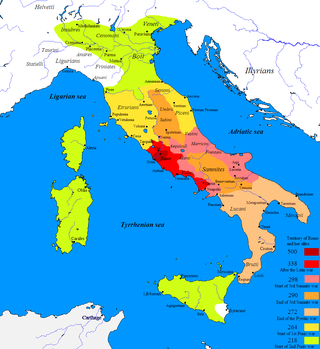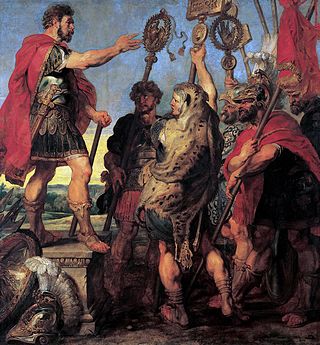This article concerns the period 349 BC – 340 BC.
During the 290s BC, Hellenistic civilization begins its emergence throughout the successor states of the former Argead Macedonian Empire of Alexander the Great, resulting in the diffusion of Greek culture throughout the Levant and advances in science, mathematics, philosophy, etc. Meanwhile, the Roman Republic is embroiled in war against the Samnites, the Mauryan Empire continues to thrive in Ancient India, and the Kingdom of Qin in Ancient China, the one which in the future will conquer its adversaries and unite China, begins to emerge as a significant power during the Warring States period.
Year 340 BC was a year of the pre-Julian Roman calendar. At the time it was known as the Year of the Consulship of Torquatus and Mus. The denomination 340 BC for this year has been used since the early medieval period, when the Anno Domini calendar era became the prevalent method in Europe for naming years.
Year 299 BC was a year of the pre-Julian Roman calendar. At the time it was known as the Year of the Consulship of Paetinus and Torquatus/Corvus. The denomination 299 BC for this year has been used since the early medieval period, when the Anno Domini calendar era became the prevalent method in Europe for naming years.

The Osci were an Italic people of Campania and Latium adiectum before and during Roman times. They spoke the Oscan language, also spoken by the Samnites of Southern Italy. Although the language of the Samnites was called Oscan, the Samnites were never referred to as Osci, nor were the Osci called Samnites.

The First, Second, and Third Samnite Wars were fought between the Roman Republic and the Samnites, who lived on a stretch of the Apennine Mountains south of Rome and north of the Lucanian tribe.
Marcus Valerius Corvus, also sometimes known as Corvinus, was a military commander and politician who served in the early-to-middle period of the Roman Republic. During his career he was elected consul six times, beginning at the age of twenty-three. He was appointed dictator twice and led the armies of the Republic in the First Samnite War. He occupied the curule chair twenty-one times throughout his career. According to legend, he lived to the age of one hundred.

Lucius Cornelius Scipio Barbatus was one of the two elected Roman consuls in 298 BC. He led the Roman army to victory against the Etruscans near Volterra. A member of the noble Roman family of Scipiones, he was the father of Lucius Cornelius Scipio and Gnaeus Cornelius Scipio Asina and great-grandfather of Scipio Africanus.

The gens Manlia was one of the oldest and noblest patrician houses at Rome, from the earliest days of the Republic until imperial times. The first of the gens to obtain the consulship was Gnaeus Manlius Cincinnatus, consul in 480 BC, and for nearly five centuries its members frequently held the most important magistracies. Many of them were distinguished statesmen and generals, and a number of prominent individuals under the Empire claimed the illustrious Manlii among their ancestors.
The Battle of Sentinum was the decisive battle of the Third Samnite War, fought in 295 BC near Sentinum, in which the Romans overcame a formidable coalition of Samnites, Etruscans, and Umbrians and Senone Gauls. The Romans won a decisive victory that broke up the tribal coalition and paved the way for the Romans' complete victory over the Samnites. The Romans involved in the battle of Sentinum were commanded by consuls Publius Decius Mus and Quintus Fabius Maximus Rullianus.

The (Second) Latin War of 340–338 BC was a conflict between the Roman Republic and its neighbors, the Latin peoples of ancient Italy. It ended in the dissolution of the Latin League and incorporation of its territory into the Roman sphere of influence, with the Latins gaining partial rights and varying levels of citizenship.

Publius Decius Mus, son of Quintus, of the plebeian gens Decia, was a Roman consul in 340 BC. He is noted particularly for sacrificing himself in battle through the ritual of devotio, as recorded by the Augustan historian Livy.

Titus Manlius Imperiosus Torquatus was a famous politician and general of the Roman Republic, of the old gens Manlia. He had an outstanding career, being consul three times, in 347, 344, and 340 BC, and dictator three times, in 353, 349, and 320 BC. He was one of the early heroes of the Republic, alongside Cincinnatus, Cornelius Cossus, Furius Camillus, and Valerius Corvus. As a young military tribune, he defeated a huge Gaul in one of the most famous duels of the Republic, which earned him the epithet Torquatus after the torc he took from the Gaul's body. He was also known for his moral virtues, and his severity became famous after he had his own son executed for disobeying orders in a battle. His life was seen as a model for his descendants, who tried to emulate his heroic deeds, even centuries after his death.

Publius Decius Mus, of the plebeian gens Decia, was a Roman consul in the years 312 BC, 308 BC, 297 BC and 295 BC. He was a member of a family that was renowned for sacrificing themselves on the battlefield for Rome.
The Battle of Tifernum was an important battle of the Third Samnite War, fought in 297 BC near Castropignano, either on the banks of the river Biferno or near the Matese mountains in the province of Campobasso, in what is now southern Italy, where the Romans overcame a determined Samnite army. The result would lead to the decisive Battle of Sentinum, which granted Rome the domination of central Italy.
The gens Decia was a plebeian family of high antiquity, which became illustrious in Roman history by the example of its members sacrificing themselves for the preservation of their country. The first of the family known to history was Marcus Decius, chosen as a representative of the plebeians during the secession of 495 BC.

The Battle of Saticula, 343 BC, was the second of three battles described by the Roman historian Livy, in Book Seven of his history of Rome, Ab Urbe Condita, as taking place in the first year of the First Samnite War. According to Livy's extensive description, the Roman commander, the consul Aulus Cornelius Cossus was marching from Saticula when he was almost trapped by a Samnite army in a mountain pass. His army was only saved because one of his military tribunes, Publius Decius Mus, led a small group of men to seize a hilltop, distracting the Samnites and allowing the consul to escape. During the night Decius and his men were themselves able to escape. The next day the reunited Romans attacked the Samnites and completely routed them. Several other ancient authors also mention Decius' heroic acts. Modern historians are however sceptical of the historical accuracy of Livy's account, and have in particular noted the similarities with how a military tribune is said to have saved Roman army in 258 BC during the First Punic War.
Lucius Papirius Crassus was a Roman politician. He was appointed dictator in 340 BC, and consul in 336 BC and 330 BC. Lucius Papirius was from the Papiria gens (family) in Rome.
Aulus Cornelius Cossus Arvina was a Roman statesman and general who served as both consul and Magister Equitum twice, and Dictator in 322 BC.









